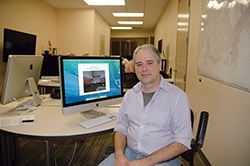UA Group Employs 21st-Century Technology For Classical Studies
by May 26, 2014 12:01 am 97 views

University of Arkansas students this fall have an opportunity to earn a core humanities credit while playing a video game, thanks to the efforts of classical studies associate professor David Fredrick and his game-designing team.
Four full-time employees and 18 students — with diverse study areas, including computer programming, graphic design, history, English and drama — have been working since December to create the game.
Fredrick believes it to be a powerful, immersive way of teaching, in this case, about the Roman Empire.
The students enrolled in the class might, for example, be given a role as a prominent person in the community and tasked with rallying support in the political arena from the lower class. It is essential for success in the game to navigate the social mechanics of Ancient Rome, Fredrick said. The game also requires students to learn about the art and artists of the time as well as the role of family in the culture, and also understand the context of major events.
Fredrick, also director of humanities for the J. William Fulbright College of Arts and Sciences, first started on the teaching through games course in 2011, when he thought it would be neat to build a digital recreation of the destroyed city of Pompeii. That particular project has proved to be incredibly complex, but the professor hopes to complete it in three or four years.
In the meantime, the model was tested during the fall semester 2013, by a 25-student class on mythology. The course was a hit with the students, Fredrick said.
For the Roman Empire course that begins in August, the capacity was raised to 150 students, and the class was filled within a week from the beginning of registration. Fredrick said when students were taking to Twitter to express their excitement for enrolling in the class, he knew: “We’re onto something.”
If all goes well, Fredrick hopes to take his team into the private sector, believing the game-designing industry is there for the taking in Arkansas.
But first, he wants to concentrate on doing right by the UA. The university has set as a goal to become a top-50 school, and innovative teaching like this will set it on that course, Fredrick said.
